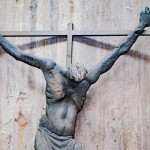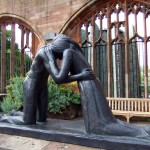Matthew, the Evangelist (18: 15-20) opens in chapter 18 a community speech that has as its objective the internal life of its ecclesial community, warning of dangers and giving disciplinary instructions to be applied in moments of difficulties. Precisely what is proclaimed in today’s Gospel is parts of these instructions for dealing with conflicts within community life.
We can distinguish it into three parts: The first refers to the conflict; the second is the power to resolve that conflict; and the third indicates the source from which that power comes from.
The most important of the three is the third part: “Where two or three are gathered in my name, there am I in their midst.” This affirmation is nuclear in ecclesiastical life. The ecclesial community is insofar as when gathered in the name of the Lord. This is constitutive and essential. The hallmark of the ecclesial community is that it is gathered in the name of the Lord, and he is present in its midst. A living and effective presence.
The Eucharist always begins in the name of the Father and the Son, and the Holy Spirit. The sign of the cross is not an indication that we are about to begin, but rather it is properly the beginning and foundation of that celebration. It should be the first words of the presider of the assembly, in each liturgical celebration, and should be carried out with all the intensity and solemnity possible. Let it be noted that this is not a formality but rather the beginning of the celebration.
Because the Lord is present and in our midst, it is possible and certain what was affirmed in the 2nd part: “Whatever you bind on earth will be bound in heaven, and whatever you lose on earth will be lost in heaven”. In chapter 16 of Matthew, these words are addressed only to Peter; but in chapter 18, with the same words, the community is constituted with those powers. I am aware that the words about Peter have usually been stressed and these words about the community have hardly ever been emphasized. It is the whole church, it is the ecclesial community that enjoys this power, and it can and should be exercised. At the beginning of the Mass we prayed “I confess to almighty God and to you, my brothers and sisters.” There is a community and before it we confess our sins. We end the prayer by saying “Therefore I ask … to pray for me to the Lord our God”. We implore the intercession of the whole community together with all of the saints so that God may forgive us. But at the same time as the intercession, our intention of forgiveness is also united. Forgive each and every one of our brothers and sisters and gather for the celebration of the Eucharist. You see, asking for forgiveness is not easy, but granting forgiveness can be much more difficult. This is why we add to the “Our Father”, “forgive us our trespasses as we forgive those who trespass against us.” God’s forgiveness becomes effective in our hearts when we also forgive those who have sinned against us from our hearts.
And this is where the first part of the Gospel appears: “If a brother of yours sins against you”. To solve this matter of “sins, imperfections, abandonment” within the community, Matthew asks for the help of everyone in a gradual way to make the “sinner” return to the normal course of community life. A process of authentic fraternal correction is carried out. But this can only be done if the fraternal life of the community is really given or if the previous steps we have indicated have been fulfilled. Fraternal life in a community cannot begin with fraternal correction. To achieve it, it is necessary to have grown in the exercise of charity. When this happens, the joy of forgiveness is comforting, regenerating and makes one enter into a feast. The sacrament of reconciliation should resemble this.
St. Paul to the Romans (13, 8-10) urges us to live from love. We owe no one anything but love. He who loves does not harm his neighbor, so to love is to fulfill the entire law.
In the prophet Ezekiel (35: 7-9) there is a call of responsibility for one another. There are situations in which one cannot be silent. The truth will always be true even if no one fulfills it; and the lie will always be a lie even if everyone accepts it as truth. That the love is the fullness of the law is the truth. And our task is to be witnesses of the truth. For this, there will be times when it is necessary to unmask harmful or false attitudes in some of our brothers and sisters or peers. URge the truth from sincerity and humility will always be good. I can help my brother find the truth and also, I am consistent with my lifestyle. In this society of ours where the “truth” has been diluted in post-truth or simply denied and has been changed by various selfishness, we have an abundant task. Let us begin by being witnesses to the Truth, that our believing communities shine by living this Truth and we know the proposed paths so that the world comes to live the fullness of love that is nothing than living for Christ, with Christ, and in Christ.




